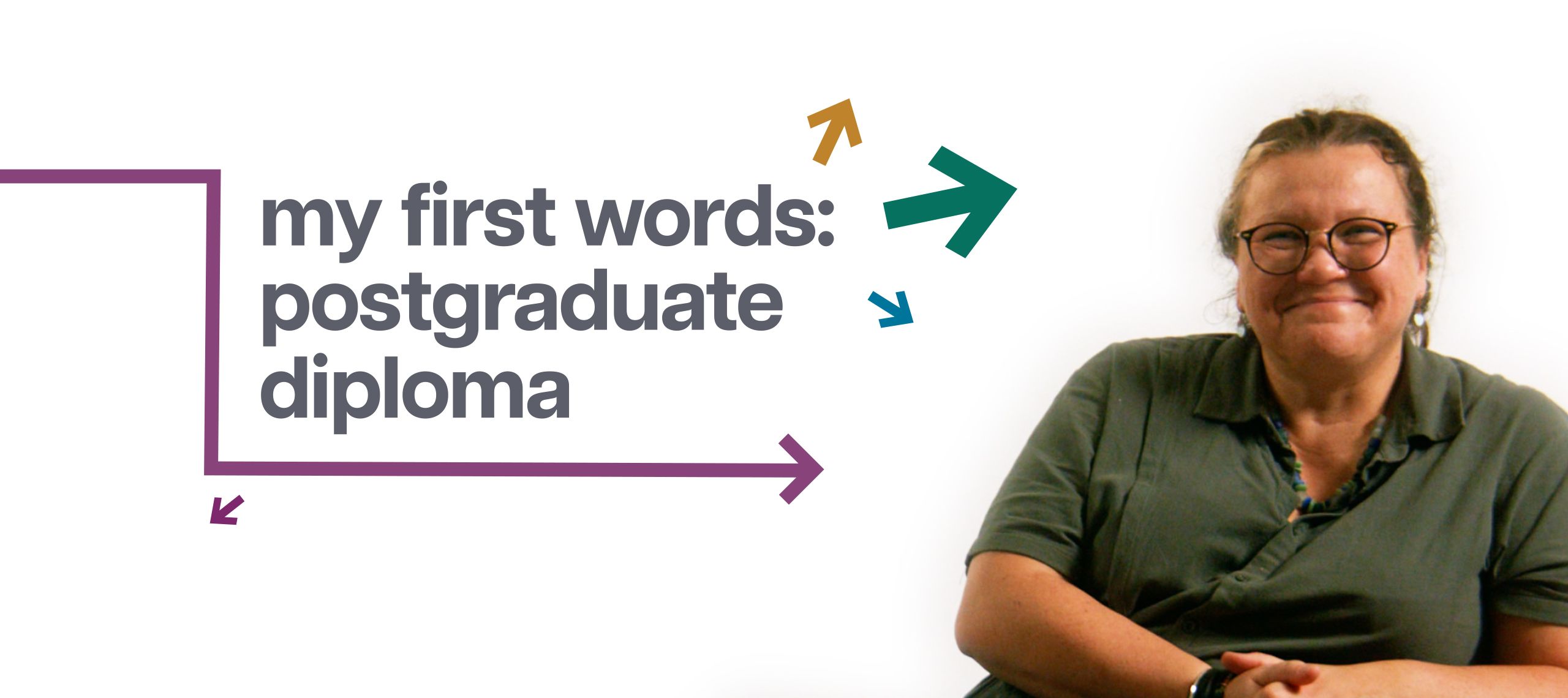
Research Journeys: My first words: Postgraduate diploma
My mum instilled in me a love of learning and of reading. She used to read every day.
What’s in a word? The Dialect and Heritage Project, which Kathleen manages, celebrates the nuances of language around the UK.
Her work gives everyone the opportunity to share and preserve the words and phrases that are unique to them and their geographic location. She wants to continue to celebrate the lives, histories, and traditions of ordinary folk.
Transcript
[Kathleen is sitting in front of a white background speaking directly to camera.]
Kathleen: My mum was a bedmaker at Morling College, Cambridge. So, she used to go and clean and tidy postgraduates' rooms.
When she had my sister, she used to leave my sister with her grandmother for childcare while she went to work. Unfortunately, when I came along, my great grandmother wasn’t around, so my mum would have to take me to work. while my sister was at nursery. She used to leave me with a postgraduate student. He came from a big family, and he missed his family, so she left me with him in the common room and he used to read to me, and he used to play me the piano while she went off and worked.
So, my sister and I had very different experiences of childcare at that age. And her first words were “Yeah, alright, init, more!” and my first words were “Postgraduate diploma”. My mum also instilled in me a love of learning and of reading. She used to read every day. She left school without any qualifications. She was the oldest child of six.
So, I grew up loving words and I studied English literature. So, yet more words. The project that I'm involved in now is the Dialect and Heritage Project, which is funded by the National Lottery Heritage Fund and led by the University of Leeds. It's a project that involves words.
In the 1950s, the University of Leeds sent out some academics led by Dr. Harold Orton, to go and collect words from around the country. So, academics travelled by caravan, motorbike by car. One of them wanted a bicycle, but that just wasn't practical. And they went over to over 300 places across the country to collect words from very isolated rural places, because Dr. Orton believed that words would disappear in the postwar period with the more mobilised population. People were moving around and taking their words with them. That project was known as the Survey of English dialects, and it is still referred to by linguistics scholars now. And all the material from that project was housed in the archives here at the University of Leeds.
Dr. Fiona Douglas, a visionary Scots scholar, was introduced to this archive a few years ago. And she was so enamoured by all the words that came from working people up and down the country that she was determined to get them back to those people. So, it was very early days, but the Dialect and Heritage Project was then born.
Many years and many funding bids later, Dr. Douglas has put together a team of people who have digitised the archive, and have made those sound recordings, that were made on old reel-to-reel tapes, so people at home can access them via the University Special Collections website and via our project website.
We set out to deliver events up and down the country. So, we worked with five partner museums, and we put an engagement officer in each of those museums. We have even found descendants of the original interviewees and been able to playback recordings to them of their ancestors, some of whom were born in the 1880s, 1870s or even earlier. So, playing back those voices to their descendants, it's really powerful stuff.
So, we have events up and down the country with our partner museums, and we're collecting words via a survey. A new survey called The Great Big Dialect Hunt. And what we're doing is we're collecting new words, new dialect words or old dialect words. Words that people may have inherited from family members or adopted from friends or work colleagues.
In the 1950s, the survey of English dialects looked for old white men with good teeth, because you need to be able to pronounce the words on the recordings. So, teeth have a big influence on that. But we're looking for everyone. We're asking everyone and anyone to take part. Anyone who has a special word that they think other people don't use or an unusual word.
Through this project, we've had lots of messages and letters from people who are interested in words. We have a letter from a chap in Liverpool who’s a truck driver and he left school without any qualifications, and he wrote to us to say that he came across our project and completed the survey and he wanted to thank us because never in his wildest dreams did he ever think that he would take part in university research. Now he has. And I know how he feels.